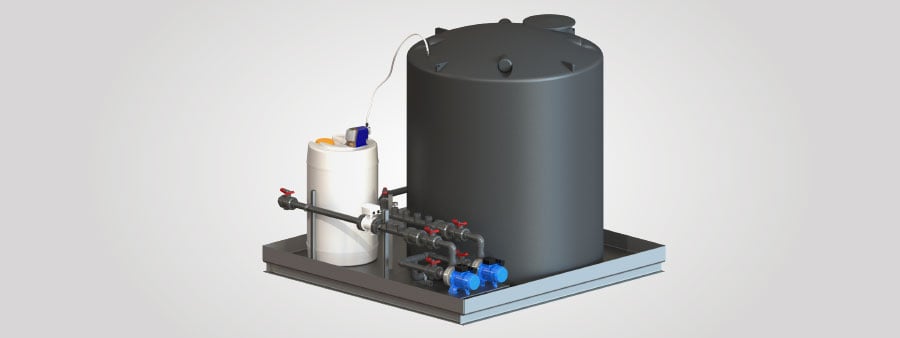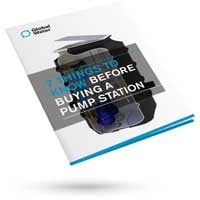What to know about treating tradewaste
Global Water provides water treatment solutions for a wide range of applications. For over 40 years’, the team have been commissioning process water and trade waste treatment systems, including chemical dosing, for a diverse range of industries.
In this month’s blog, our team share their knowledge on trade waste, requirements before discharging to the sewerage network and common treatment methods.

What is trade waste?
Trade waste refers to all liquid waste generated on industrial or commercial premises that needs some form of treatment prior to discharge to the sewer network. The type of treatment depends on what operation is generated trade waste and what the contaminants are that need to be treated.
The simplest example of trade waste treatment is installing a grease arrestor on the discharge from retail food preparation premises such as restaurants or takeaway food shops. You can read more here. However, when trade waste is from industrial or manufacturing applications, complex treatment processes may be required.
There are several restricted wastewater acceptance standards that outline the prohibited physical and chemical characteristics of discharged substances. SA Water in South Australia outlines the following characteristics for trade waste entering the sewerage network:
Required physical characteristics of trade waste
Prior to discharge, SA Water (as would other water authorities) assess the nature of the trade waste and advise of treatment requirements (if believed to be required).
- Temperature: must not exceed 38oC
- Volume & flow rate: determined by the receiving sewerage system capacity
- Colour and odour: determined by the SA Water Trade Waste Team
Required chemical characteristics of trade waste
- Biochemical Oxygen Demand (BOD5) - 5 Days:
- Grease & oil: ≤100 mg/L
- pH: Within the range of 6 - 10
- Suspended solids (SS): ≤500 mg/L
- Total dissolved solids (TDS): 1500 mg/L
It is crucial you check with your local water authority on their specified characteristics.
Besides these physical and chemical characteristics, trade waste must also largely avoid:
- Substances such as fibrous material, large solid particles, materials likely to polymerise that could block or otherwise be detrimental to the operation of the sewerage system
- Volatile solvents or other substances that can generate hazardous gases or vapours in the sewerage system.
- Chlorinated hydrocarbons
- Fluorinated surfactants
- Discrete oil or other materials that are immiscible with water
All water authorities have legislation trade waste discharge into their reticulation systems, and penalties may apply for unauthorised or non-compliant discharge.
Treatment Options
Depending on the type of application, there are several basic trade waste pre-treatment requirements. A detailed list of SA Water requirements can be found here.
Common treatment options for trade waste from the listed applications, include one, or all the following treatment methods:
- Silt trap / screening / strainer
- Solids settling pit.
- Oil water separator
- Grease arrestor
- Screening / channel
After lodging your application with the local water authority, you will be advised if your trade waste requires further, advanced treatment.
Global Water’s solution for further, advanced trade waste treatment
Global Water offers a range of advanced treatment options for trade waste. Depending on the scope of treatment required, one or a combination of the following could be installed:
- The Global Water Grease Muncher GM700 Grease Arrestor combines the conventional underflow grease arrestor design with a special bio-filter to dramatically reduce the grease content through microbiological activity. This grease arrestor achieves solids and grease reduction up to 90%, BOD (Biochemical Oxygen Demand) by 45% and a biological filter that removes solids down to 2mm. This device is compliant to SA Water standards for Grease Arrestors and successfully achieves a 1,000 L/hr flow rate.
- The Global Water Oil Muncher Oil Water Separator effectively remove oils and solids from trade waste and washdown. Heavy solids settle out in the chamber, and 100% oil slugs rise immediately to the surface. The remaining water mixtures flow through a stack of closely spaced, corrugated polypropylene plates.
- Chemical dosing systems: Global Water's wide range of dosing systems allows for pH correction and heavy metals removal, ensuring the trade waste quality meets the local distribution’s water guidelines. These can be supplied as under-bench packages for laboratories, through to complete end-of-process bespoke systems including monitoring equipment and alarms.
Want to learn more about trade waste treatment? Get in touch with Global Water to discuss your application and a suitable device for your site’s needs!
Tags: Chemical, Wastewater, Grease Arrestor




